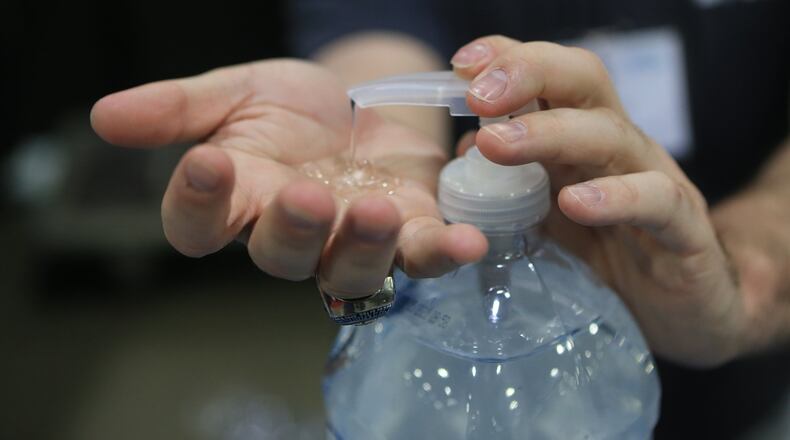It was Wednesday when the threat of the coronavirus went from theoretical to real for much of America.
It had been hanging around for weeks, and we were all on some sense of cognitive alert. But it seemed far removed, like the faint rumble of thunder in the distance.
Earlier that day, I attended a committee meeting in a crowded room at Atlanta City Hall, and more than an hour was spent talking about slowing down traffic before the airport general manager was asked about how he’s dealing with the new coronavirus, COVID-19.
At first, personal interaction seemed normal. I shook hands with two or three people at the meeting, and later I shook hands with a couple of folks during man-on-the-street interviews. Yeah, I’ve taken to washing my hands more often, fist-bumping during greetings and kick-flushing toilets, but when a stranger reaches out for a handshake, it’s instinctual to reciprocate.
But then the rest of Wednesday started to unfold: The stock market continued its nosedive. The NBA announced it was shutting down. The NCAA Final Four basketball tournament, which Atlanta had been preparing to host for years, would now be played without a crowd. (The next day, the NCAA announced the tournament would be canceled altogether.) A dour Donald Trump partially closed the door on Europe. And then Tom Hanks and his wife tested positive for COVID-19.
Hanks’ announcement quickly sank in as a Rock Hudson moment, reminiscent of 1985, when AIDS — still an obscure disease to much of the public at that time — suddenly had a very familiar face.
I called my lifelong friend Mary Jean in Seattle when I heard that the Mariners’ home opener was being moved. This was before Thursday’s announcement that Major League Baseball was pushing back its season for a while. She was gloomy, having days earlier sent her office workers home and now gazing upon eerily sparse traffic on I-5.
It all had the surreal feel of a movie in which a contagion from outer space is loosed upon the world and its reality is sinking in on us Earthlings.
On Wednesday, Georgia had 22 confirmed cases of COVID-19. Thursday morning it was 31, and Thursday afternoon, authorities confirmed Georgia's first coronavirus-related death.
By week's end came the litany of postponements and closings — schools, ball games, offices (we at the AJC are advised to work off-site), museums and restaurants.
A CNN headline popped up on my news feed: “Take this seriously. Coronavirus is going to change your life for a while.”
We are hearing terms like mitigation, containment, "social distancing" and "flattening the curve" of the pandemic, the latter being a way to at least slow the progression of the disease so health professionals can keep up with it.
We’re urged to be wary about going out, to make it count when we do, and to not needlessly gather in large groups. But it’s a fine line. Some people must leave the house to earn a living. And if the rest of us self-isolate for too long, businesses will collapse, and the workers least able to afford the hit will get hit the hardest.
I drove around Thursday to talk with folks to get a random sense of where their minds were during this time. I visited the DeKalb County Public Health building, the VA clinic, the DeKalb Farmer’s market and a Kroger — I wanted to see panic buying firsthand (and see if they had any toilet paper. My family was down to single digits in rolls).
I spoke with about 20 people. Opinions varied. There was Rudolph Ward, a Vietnam veteran who is a minister, who told me, “It’s a bunch of propaganda the media is putting out.”
Fulton County resident Sandy Richardson said, “I believe in being cautious, but I refuse to believe in the madness or the collective fear.”
And a young woman from Decatur said she was getting worried. “It’s strange,” she said. “It feels like the zombie apocalypse.”
The woman, who asked that her name not be used, was at the farmer’s market to stock up because she and her boyfriend planned to stay in place for a couple of weeks. On Thursday, they learned her boyfriend’s co-worker is in quarantine, awaiting test results. They think he has it.
“It’s closed in on us,” she said.
Leigh McClure, a Decatur resident who works at a private school, was there for much the same reason: the school was closing. “I’m thinking of staying home for the next two to three weeks. This is one of my last steps,” she said.
“There seems to be a point where containment won’t occur unless we all just stay home,” she said. “I woke up this morning and said, ‘Today is the day.’”
Chris Buchanon, a DeKalb resident, said his opinion of the seriousness has changed over the past few days. He said he’s staying away from his aging parents.
As for the Kroger in downtown Decatur, it was unusually busy for a Thursday afternoon, said a worker there.
Elizabeth Gilchrist was carrying three bottles of bleach from the store. She owns several Airbnbs and had to lay off the woman who cleans them. Not that she’ll have a lot of cleaning to do herself. “I’ve had seven cancellations between yesterday and today,” she said.
“Yesterday seemed to be the turning point in all this,” Gilchrist told me. “Someone coming in Monday for a funeral canceled. A funeral!”
Lawton Jordan was packing groceries in his vehicle.
“I think we’ll be shut down for a couple months,” he said.
I asked how he felt about the near future.
“Cautiously unoptimistic,” he said with a grin. He then stuck out his hand and we shook.
It’s a reflex I’m going to have to shake.
About the Author
Keep Reading
The Latest
Featured








